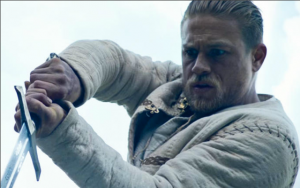Metro In Focus: How Guy Ritchie came around to the Dog & Pony Show.
 By Richard Crouse – Metro In Focus
By Richard Crouse – Metro In Focus
Guy Ritchie’s films have entertained me for years but I’m afraid he didn’t find me very interesting.
The incident happened during my press day with Ritchie and Charlie Hunnam, the director and star of King Arthur: Legend of the Sword. I first spoke with them for television. Hunnam answered my opening question about the film Excalibur, a precursor to their movie, enthusiastically. But I could feel Ritchie disengage. He sat back and went into autopilot, answering my questions by rote. The rest of the interview flew by in a flurry of quips and tossed off answers.
Half-an-hour later I sat with them again to do a longer interview for print.
“I’m glad we can make amends,” said Hunnam as I came in the room. “It seemed like you wanted to have a proper conversation and we were having a bit of a jolly up.”
The whole experience was an example of the yin and yang of movie promotion. The yin was Ritchie, an intense man who refers to the walking a red carpet as “a dog and pony show” before adding that’s not what he’s here for.
The yang is Hunnam, an engaging actor who said, “We don’t make these things to live on in obscurity, we make them with the hope that people will see them and this is one of the ways we can help manifest that.”
The duo have been all over the world talking to media people with perfectly coiffed hair and big smiles, answering the same questions on repeat. By the time I get them there’s nothing new to ask about their update of the Arthurian legend. But there is an unspoken contract between my interview subjects and me.
Whether it’s for television or for the paper you hold in your hands, the deal is the same. They say something interesting and I report it. They get publicity and I get a story that my audience will hopefully enjoy.
As Ritchie sat with his arms folded across his chest, I thought about our “contract” and the difference between the two men.
Despite his tabloid appeal — for a time the British press made a sport of reporting on him — Ritchie strikes me as a private person. He’s more interested in what he’ll be working on next than the film he spent years making and has now signed off on. Or perhaps it’s that, as a director, he’s used to being in control and in these situations he has to cede power to the interviewer.
“We both know why we’re doing it,” Ritchie says, “but the red carpet last night, I’ll tell you, I felt soulless after that. After ten minutes get me off there because it takes me hours to recover.”
Hunnam, the performer, is immediately warm and open. When Ritchie talks about losing patience on press days Hunnam jokes, “Guy Ritchie leaves the room and Johnny Nasty shows up.”
Luckily, Johnny Nasty never showed. By the end of our time together the ice broke, Ritchie’s arms unfolded and he smiled. I’m not sure what happened other than he seemed to warm up to me when we talked generally about film and not specifically about King Arthur.
We traded stories, discussed King Arthur, an actor’s connection to their director and not being imprisoned by fear. Maybe it was just me but for a moment it felt like we were talking over a beer in a bar and not fulfilling our respective contractual duties. It was, in his words, a little less of a dog and pony show.
“I feel more satisfied now,’ said Hunnam as I left and another press person walked into the room to repeat the process. “I really felt bad after the [television] interview [with you]. I thought, ‘Man, that’s a serious cat and we really just f–ed around for four minutes.’ I’m glad we got into some of the nitty-gritty.”
